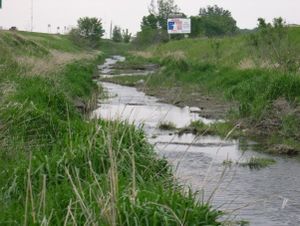
Difference between revisions of "Wet swale (wetland channel)"
m |
m |
||
| Line 19: | Line 19: | ||
*[[Case studies for wet swale (wetland channel)]] | *[[Case studies for wet swale (wetland channel)]] | ||
*[[External resources for wet swale (wetland channel)]] | *[[External resources for wet swale (wetland channel)]] | ||
| − | *[[References for wet swale (wetland channel)]] | + | *[[References for dry swale (grass sawale)|References for wet swale (wetland channel)]] |
*[https://stormwater.pca.state.mn.us/index.php?title=Requirements,_recommendations_and_information_for_using_wet_swale_as_a_BMP_in_the_MIDS_calculator Requirements, recommendations and information for using wet swale in the MIDS calculator] | *[https://stormwater.pca.state.mn.us/index.php?title=Requirements,_recommendations_and_information_for_using_wet_swale_as_a_BMP_in_the_MIDS_calculator Requirements, recommendations and information for using wet swale in the MIDS calculator] | ||
*[[Requirements, recommendations and information for using swale side slope as a BMP in the MIDS calculator]] | *[[Requirements, recommendations and information for using swale side slope as a BMP in the MIDS calculator]] | ||
*[[wet swale (wetland channel) and interesting websites]] | *[[wet swale (wetland channel) and interesting websites]] | ||
Revision as of 20:08, 9 March 2018
This site is currently undergoing revision. For more information, open this link.
This site is in development
This site is in development
Green Infrastructure: Swales can be an important tool for retention and detention of stormwater runoff. Because they utilize vegetation, swales provide additional benefits, including cleaner air, carbon sequestration, improved biological habitat, and aesthetic value.
Wet swales occur when the water table is located very close to the surface or water does not readily drain out of the swale. A wet swale acts as a very long and linear shallow biofiltration or linear wetland treatment system. Wet swales do not provide volume reduction and have limited treatment capability. Incorporation of check dams into the design allows treatment of a portion or all of the water quality volume within a series of cells created by the check dams. Wet swales planted with emergent wetland plant species provide improved pollutant removal. Wet swales may be used as pretreatment practices. Wet swales are commonly used for drainage areas less than 5 acres in size.
Wet swale (wetland channel) articles
- Terminology for swales (grass channels)
- Overview for wet swale (wetland channel)
- Types of filtration
- Design criteria for wet swale (wetland channel)
- Construction specifications for wet swale (wetland channel)
- Operation and maintenance of wet swale (wetland channel)
- Assessing the performance of wet swale (wetland channel)
- Calculating credits for wet swale (wetland channel)
- Cost-benefit considerations for wet swale (wetland channel)
- Case studies for wet swale (wetland channel)
- External resources for wet swale (wetland channel)
- References for wet swale (wetland channel)
- Requirements, recommendations and information for using wet swale in the MIDS calculator
- Requirements, recommendations and information for using swale side slope as a BMP in the MIDS calculator
- wet swale (wetland channel) and interesting websites
